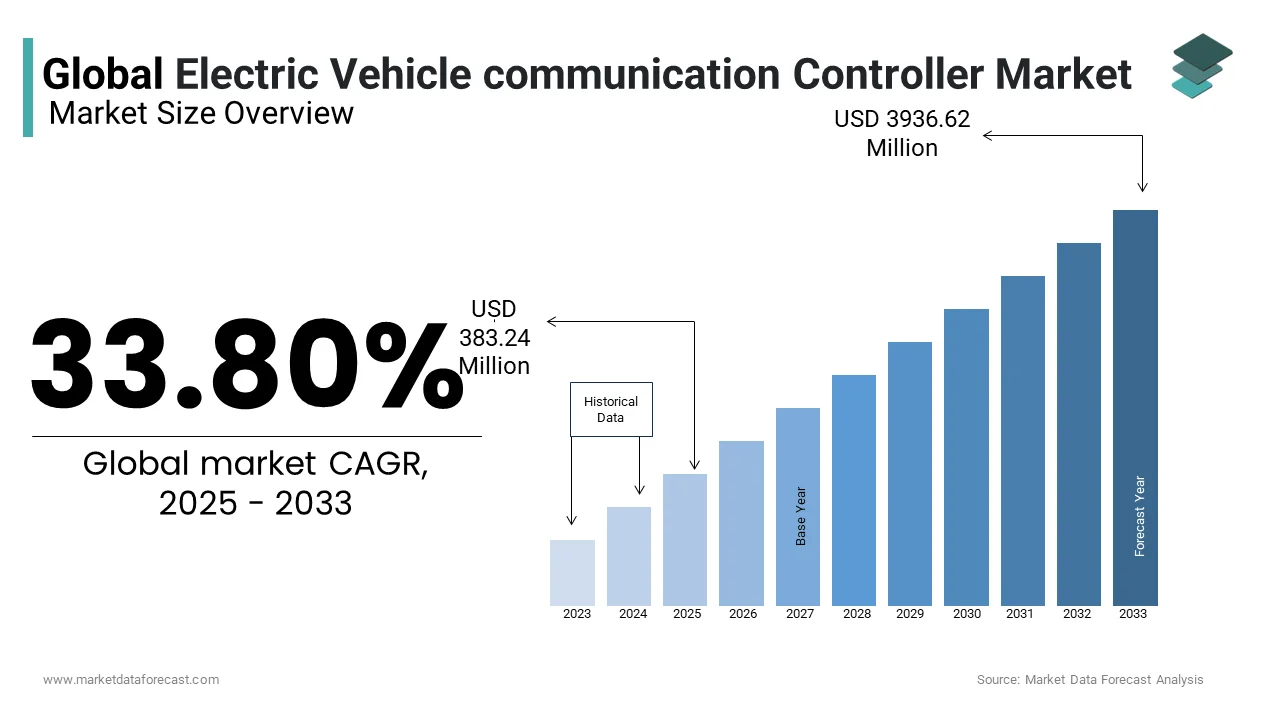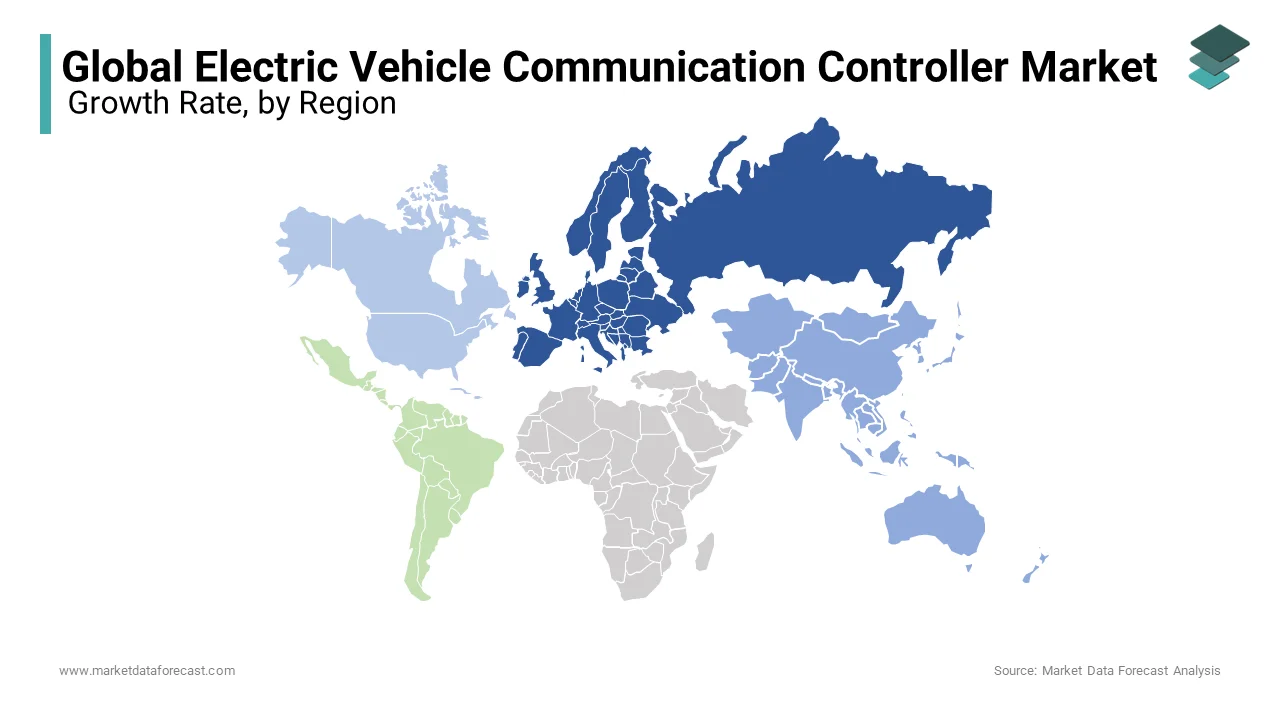Global Electric Vehicle Communication Controller Market Size, Share, Trends, and Growth Forecast Report, Segmented By System (Vehicle Based Communication Controller, And Supply Equipment Communication Controller), Charging Type (Wired Charging, And Wireless Charging), Vehicle Type (Battery Electric Vehicle, And Plug-In Hybrid Electric Vehicle), Application Type (Passenger Vehicle, And Commercial Vehicle), And Region (North America, Europe, Asia-Pacific, Latin America, Middle East And Africa), Industry Analysis (2025 to 2033)
Global Electric Vehicle Communication Controller Market Size
The global electric vehicle communication controller (EVCC) market was valued at USD 286.43 million in 2024 and is anticipated to reach USD 383.24 million in 2025 from USD 3936.62 million by 2033 and growing at a CAGR of 33.80% from 2025 to 2033.

The vehicle communication controller not only collects electricity from the electric vehicle supply equipment (EVSE), but it also works as a getaway to exchange knowledge between the vehicle ECU and the external charger. The various manufacturers are shifting toward the self-charging of the battery within hybrid cars, unlike the opposite plug-in electric vehicle which doesn't require the facility socket or the overnight charging of the battery. The electric vehicle communication controller has observed fast evolution with ongoing growth within electric vehicles, charging infrastructure, and battery technology.
MARKET DRIVERS
The rise in the adoption of electrical vehicles (EV) and ongoing work for the events of electrical vehicle supply equipment with a serious specialization in fast-charging solutions is primarily propelling the growth of the global electric vehicle communication controller market. The growing public-private partnerships (PPP) for charging stations is further boosting the market’s growth rate. The government is alliancing with primary equipment manufacturers (OEMs) and automotive developers for the development of fast-charging stations, which is predicted to fuel the growth rate of the EVCC Market.
The growth of the global electric vehicle communication controller market is primarily driven by the growing production and consumption of new electric vehicles. The development of electric vehicle technology, all at once, along with the rising investment of automakers in electric vehicles, is likely to drive demand for the electrical vehicle communication controller market. The government support and initiative towards the electric vehicle, by reducing the rate and rate of interest on the vehicle loan, is probably going to spice up the demand for the electric vehicle, and it will directly impact the electric vehicle communication controller market. The expected energy crisis and the necessity to scale back greenhouse emissions have led vehicle manufacturers to form a significant effort to scale back the energy consumption of their vehicles and they are presently developing vehicles completely or partly driven by electricity, which is probably going to propel the demand for the electrical al and hybrid vehicles, and it somehow affect the global electric vehicle communication controller market in future.
MARKET RESTRAINTS
The insufficiency of standardization in charging infrastructure is probably going to challenge the expansion of the electric vehicle communication controller market. Strict rules and regulations concerning the installation of charging stations might obstruct the growth of the electrical vehicle communication controller market.
REPORT COVERAGE
|
REPORT METRIC |
DETAILS |
|
Market Size Available |
2024 to 2033 |
|
Base Year |
2024 |
|
Forecast Period |
2025 to 2033 |
|
CAGR |
33.80% |
|
Segments Covered |
By Application, Vehicle Type, Charging Type, System, and Region. |
|
Various Analyses Covered |
Global, Regional, & Country Level Analysis; Segment-Level Analysis; DROC, PESTLE Analysis; Porter’s Five Forces Analysis; Competitive Landscape; Analyst Overview of Investment Opportunities |
|
Regions Covered |
North America, Europe, APAC, Latin America, Middle East & Africa |
|
Market Leaders Profiled |
LG Innotek Co. Ltd., Tesla Inc., BYD Co. Ltd., Schneider Electric SE, ABB Ltd., Ficosa International SA, Robert Bosch GmbH, Vector Informatik GmbH, Siemens AG, Mitsubishi Electric Corporation, and Others. |
SEGMENT ANALYSIS
By Application Insights
The passenger vehicle segment accounted for the most important share of the market in 2024 because of rising sales of these vehicles. This is often due to the supply of monetary subsidies and incentives offered by various governments. Moreover, various automotive manufacturers like BMW AG, Ford Motor Company, and General Motors are providing chargers alongside electric cars, which has driven the demand for the EVCC market. However, increasing emphasis on automotive developers' installation of EV charging stations for their employees to boost awareness about electric cars has fuelled interest.

By Vehicle Type Insights
The market within the BEVs category is predicted to achieve faster growth during the outlook period. The market in this category is often driven by stringent environmental norms and policies supporting the adoption of BEVs. Such factors will also drive the expansion of the electric vehicle communication controller market. EVCC held a huge volume share within the market in 2018 due to the rising sales of plug-in electric vehicles (PEVs). A total of two million PEVs were sold in 2018, marking a 64% growth in sales, as calculated in 2017. Globally, the sales of those vehicles are driven by their increasing production and government support, which includes subsidies and incentives to customers for the acquisition of those vehicles.
By Charging Type Insights
By charging types, wired charging was the biggest category, in terms of sales volume, within the electric vehicle communication controller market. This is often attributed to the low price and early adoption of conductive chargers for private vehicles across the planet.
By System Insights
The supply equipment segment is predicted to register the best CAGR over the outlook period due to the surge in demand for advanced charging stations like EV charging kiosks. In a charging kiosk, EVCC is employed for the authentication of the Vehicle number (VID) and access card information.
REGIONAL ANALYSIS
The European electric vehicle communication controller market is predicted to record the fastest growth over the projection period due to the increasing adoption of electric vehicles and related charging stations within the area. Moreover, in Europe, the plug-in electric vehicle market stood at around 384,000 units in 2018, recording a nearly 33% increase in sales from 2017. Of the entire units, 201,280 were battery-electric cars and 182,760 were plug-in hybrid electric cars. Hence, increasing the adoption of electric vehicles and their charging stations is driving the demand for electric vehicle communication controllers within the region.

Asia-Pacific had the most significant share of the electric vehicle communication controller market in 2018. This is ascribed to the high adoption of electric vehicles and the installation of related charging stations in China in recent years. Growing environmental concerns, increasing government support within the sort of subsidies for electric vehicles and related charging stations, and reducing total cost of ownership (TCO) are driving the demand for electric vehicles, which successively is positively affecting the expansion of the market in the area.
KEY MARKET PLAYERS
Some of the major Key players dominating the global electric vehicle communication controller market are LG Innotek Co. Ltd, Tesla Inc., BYD Co. Ltd, Schneider Electric SE, ABB Ltd, Ficosa International SA, Robert Bosch GmbH, Vector Informatik GmbH, Siemens AG, Mitsubishi Electric Corporation.
RECENT HAPPENINGS IN THIS MARKET
- One of the market leaders, LG Innotek, introduced its joined ‘CharIN'(Charging Interface Initiative e.V.), a world association for charging electric vehicles, as a core member.
- In India the co. BYD has announced that there will be more electric vehicles soon with the assistance of local suppliers.
MARKET SEGMENTATION
This research report on the global electric vehicle communication controller market has been segmented and sub-segmented into the following categories.
By Application
- Passenger Vehicle
- Commercial Vehicle
By Vehicle Type
- Battery Electric Vehicle (BEV)
- Plug-In Hybrid Electric Vehicle (PHEV)
By Charging Type
- Wired Charging
- Wireless Charging
By System
- Vehicle-Based Communication Controller
- Supply Equipment Communication Controller (SECC)
By Region
- North America
- Europe
- Asia Pacific
- Latin America
- Middle East and Africa
Frequently Asked Questions
What is the current size of the global electric vehicle communication controller (evcc) market?
The current size of the global electric vehicle communication controller (EVCC) market is estimated at USD 383.24 million in 2025, indicating substantial growth driven by the increasing adoption of electric vehicles worldwide.
Which region holds the largest market share in the global electric vehicle communication controller market?
Currently, Europe holds the largest market share in the global electric vehicle communication controller market, driven by the rapid adoption of electric vehicles and supportive regulatory frameworks.
What impact has the global push for electric vehicle adoption had on the demand for electric vehicle communication controllers?
The global push for electric vehicle adoption has significantly increased the demand for electric vehicle communication controllers, as these devices play a crucial role in enabling efficient and standardized communication between EVs and charging infrastructure.
What are the growth prospects for the electric vehicle communication controller market in the Asia-Pacific region?
Asia-Pacific had the most significant share of the electric vehicle communication controller market in 2024. This is ascribed to the high adoption of electric vehicles and the installation of related charging stations in China in recent years.
who are the key market players involved in the global electric vehicle communication controller market?
LG Innotek Co. Ltd, Tesla Inc., BYD Co. Ltd, Schneider Electric SE, ABB Ltd, Ficosa International SA, Robert Bosch GmbH and etc...
Related Reports
Access the study in MULTIPLE FORMATS
Purchase options starting from
$ 2500
Didn’t find what you’re looking for?
TALK TO OUR ANALYST TEAM
Need something within your budget?
NO WORRIES! WE GOT YOU COVERED!
Call us on: +1 888 702 9696 (U.S Toll Free)
Write to us: sales@marketdataforecast.com